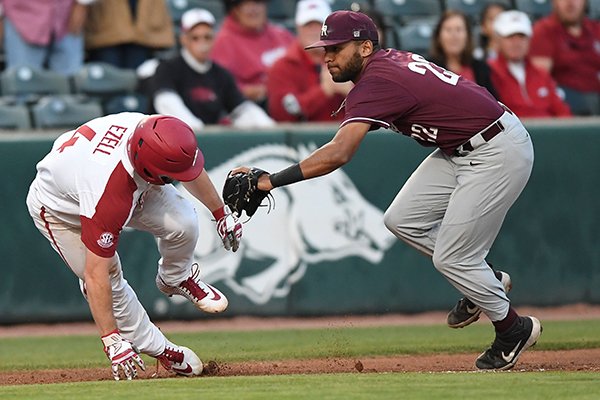FAYETTEVILLE — Some pointed to Arkansas' 17-7 loss to Arkansas-Little Rock two weeks ago to justify the Razorbacks' decades-long ban on playing in-state teams.
Such a loss never occurred on Frank Broyles' or Jeff Long's watch. They never entertained the idea of playing teams from Arkansas, no matter how convenient it might be.
Arkansas baseball coach Dave Van Horn pushed the idea to both of his former bosses. Van Horn reasoned that the games would make it easier to schedule in April when teams didn't want to travel during the middle of the week. Plus, he said, the games would promote baseball within the state.
Van Horn found a listening ear in Hunter Yurachek, who helped broker a deal among University of Arkansas trustees. The compromise was that the Razorbacks could play in-state teams in all sports, so long as they were members of the UA System.
Since then, there have been regular-season in-state matchups in baseball, softball, and men's and women's tennis. Prior to an NCAA Tournament game against UALR last November, Arkansas soccer coach Colby Hale said he was in favor of playing in-state teams and had already made overtures about doing so.
Because of the Razorbacks' baseball following, the April 2 game against UALR at Baum-Walker Stadium was the most high-profile in-state matchup. It is likely that some - if not many - Arkansas fans entered that game expecting a result more like the one Tuesday when the Razorbacks defeated Arkansas-Pine Bluff 16-4 in a run-ruled game in Fayetteville.
But not all in-state competition is the same.
Consider that UAPB entered Tuesday's game with an RPI (No. 269) and strength of schedule (275) near the bottom of college baseball. The Golden Lions (6-28) have the worst record in the SWAC, generally regarded as one of the worst conferences in the game.
UALR, on the other hand, had been tested when it came to Fayetteville. The Trojans had losses to Power Five teams Ole Miss, Mississippi State and Oklahoma State, and to strong mid-major baseball programs like Northwestern State, Louisiana-Lafayette and Louisiana Tech. Many of the losses were by two runs or less and most were on the road.
Chris Curry, the UALR head coach and a former Van Horn assistant, said prior to the series that he liked how his team had played.
"We put that schedule together two years in advance, projecting to what our roster would be with a bunch of older guys, experienced guys," Curry said. "That schedule has been very rigorous on us, but if you look at our scores, for the most part we've been very competitive in all those games and have had a chance to win."
Objectively, Arkansas' loss to UALR isn't looking so bad anymore. Since its 7-18 start, UALR has won 10 of 11 games and has positioned itself well for the stretch run in the Sun Belt Conference.
The Trojans entered Tuesday with a strength of schedule of 60 and an RPI of 117.
UALR (17-19, 9-5 Sun Belt) is coming off a two-game series sweep of then-No. 24 Coastal Carolina and has the second-best record in its league.
As the Razorbacks' first in-state game reminded, much of baseball is about who's hot and who's not.
Van Horn was asked this week whether the UALR loss made him re-think his stance on playing in-state teams who are already on the schedule in 2020 and 2021. The answer was no.
"I'm glad we're playing them," Van Horn said. "I'm looking forward to playing them this year and every year. I think it's good for baseball in the state."
A number of strong SEC teams have suffered midweek setbacks comparable or worse to Arkansas' loss to UALR.
Among them in the past two weeks: Southern over LSU, Louisiana-Lafayette over LSU and Texas State over Texas A&M.
Every SEC team has played a non-power team from its state at least once, and only four - Kentucky, South Carolina, Missouri and Ole Miss - have not lost at least one of those games (Kentucky has lost to Louisville and South Carolina has lost to Clemson).
LSU and Florida have lost four midweek games apiece to in-state competition. In addition to Southern and Louisiana-Lafayette, the Tigers have lost to Northwestern State and McNeese State this season. The Gators have lost to North Florida, South Florida, Central Florida and split with Florida Gulf Coast.
"You’re running into teams that are excited to play you, and you’re trying to keep the kids focused on the Tuesday game, but they’re thinking about the Friday game or the Thursday game," Van Horn said last week when asked about the SEC's struggles in the midweek. "It’s a tough pull there, especially this time of year.
"The Tuesday and Wednesday games have been a battle for a lot of teams, including us.”
It's safe to say that some in the state would like to see Arkansas expand its in-state policy past in-system schools. UAPB and UALR play every Division I team in the state most years.
“If I am out there recruiting and Van Horn shows up to see a kid that can play in the SEC, he is not going to choose UAPB over Arkansas," UAPB coach Carlos James said Tuesday. "That is just not going to happen."
The same could also be said for the Division I programs in Little Rock, Conway and Jonesboro. The Razorbacks are the state's superior team, just months removed from a runner-up finish at the College World Series.
No other team in the state has made the postseason since Central Arkansas in 2013.
"There is a definite pecking order in the state and we understand that," James said. "We, as coaches, get it."

